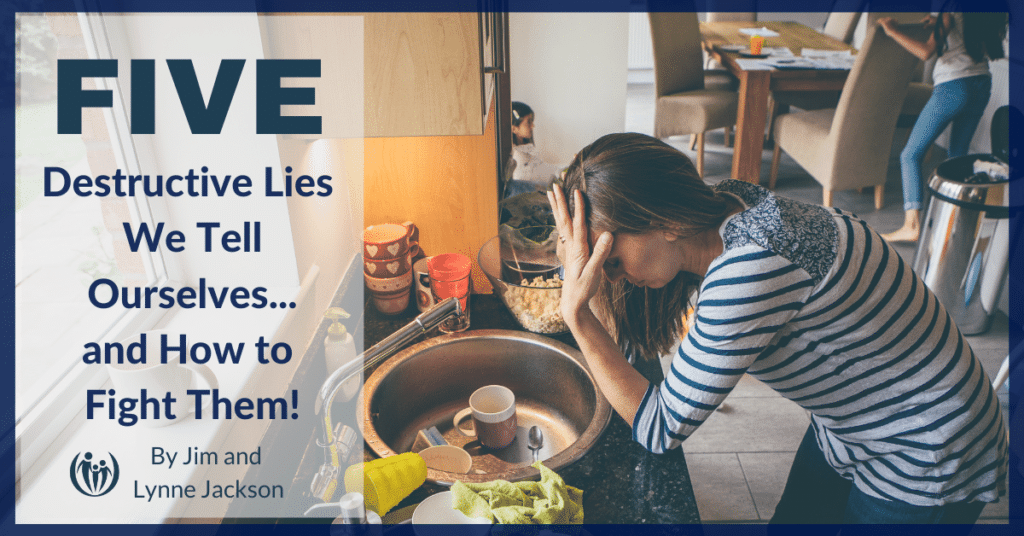
5 Destructive Lies We Tell Ourselves…and How to Fight Them!
How core beliefs deeply affect our parenting

Do you believe you are loved more when you behave well? Do you believe that how your family appears to others is more important than how your family relates to each other?
These thoughts may be so engrained you may not even be aware that they are deeply impacting your life and parenting.
As humans, we sometimes act unpredictably or irrationally. But every action has a purpose, rooted in an underlying, or “core”, belief. Our core beliefs are what guide our behavior.
The way core beliefs are formed is complex. Our environment, the media, our peers, and the homes we grew up in are major contributors to the things we believe about ourselves and others. Most of us don’t spend much time thinking about this, but the beliefs are there regardless, and contribute greatly to much of our behavior.
Core beliefs deeply affect our parenting. For example, if conflict was treated as a problem and swept under the rug in the home I grew up in, then I will likely feel very anxious about conflict and will work hard to avoid it or put a quick stop to it in my children. My core belief may be, “People should be nice and not have conflicts.”
What “tapes” do you play in your head?
The funny thing about core beliefs is that they become almost imperceptible “tapes” that play over and over again in our minds. When we learn to say them out loud they can sound almost ridiculous. But they hold power over us until we can replace them with new “tapes” or phrases that grow from truth.
An important key to maturing in life and faith is to examine our core beliefs and consider which ones are true and helpful and which ones are not. As we do this we can invite God to keep transforming our beliefs to align with truth. We can learn to live by the new truth phrases and not the old false beliefs.
Below is a list of five common unhelpful and even untrue messages you may have grown up with that many parents experience as their core beliefs:
- You’re most loved when you behave well.
- The way things look is what matters.
- Parents are responsible for their children’s behavior.
- God’s blessings make life work smoothly.
- Kids should obey the first time, every time.
You might not even realize that you are believing these unhelpful and untrue messages. But they might be impacting how you view the world and your place in it.
5 scriptural truths to combat lies
Don’t stay stuck! We’ve gathered a list of truth phrases and corresponding Bible verses to encourage you. We’ve seen these truth phrases help parents replace common unhelpful, untrue core beliefs with helpful and true ones.
1. Each family member is beloved and treasured by God, despite failings or imperfections.
2. What matters is what’s real, the things rooted in faith and love, not pretense.
3. My children are responsible for their own behavior. I am responsible for my behavior. The fruit of the Spirit is self-control, not control of others!
4. God is present and working even in our worst situations and will guide and counsel us.
5. Learning obedience is a process – for us and our kids! Quickly obeying God out of love and talking about the blessing of that is our best way to teach our kids to do the same.
Ephesians 6:4, Phillipians 4:9 (modeling obedience), Colossians 3:20-21
You can print and post this list as a frequent reminder of your value as God’s beloved child.
The transforming of our minds is a vital process, because wise, loving responses to our children naturally flow from healthy, biblical, core beliefs. You can replace faulty thinking with Biblical truth! Leaning into these beliefs isn’t another burdensome parenting task. It’s a pathway to freedom, joy, and deeper connection with your children.
Are you ready to parent more peacefully? Do you find yourself feeling angry a lot? Resilience in tough times, anchored in God’s truth, could be the best legacy you leave behind. Our Grace and Truth for Moms online course is just what you need. Grab a friend (or 2 or 10!) and register today so you can better learn to embody God’s grace in the midst of family life.








